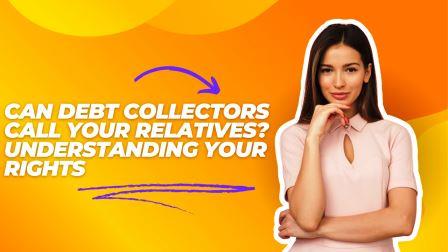Yes, it is legal for debt collectors to call third parties like relatives or friends.
Dealing with debt collectors can be stressful, especially when they start reaching out to your family members. But what are your rights when it comes to debt collection calls? Let’s dive into the legal aspects and explore what debt collectors can and cannot do.
Is It Legal for Debt Collectors To Call Your Friends or Family?
Yes, it is legal for debt collectors to call third parties like relatives or friends. However, there are strict limitations on what they can say during these calls. Debt collectors are only supposed to contact third parties under specific circumstances:
- Locating You: Debt collectors may contact your family members or friends to obtain information about your whereabouts. For example, they might ask for your home address, phone number, or place of employment.
- Contact Information: If they cannot reach you directly or lack your contact details, they may inquire with third parties to locate you. However, their communication should be limited to gathering essential information.
- Privacy Protections: Debt collectors cannot discuss your debt with any third party, including friends, family, employers, or coworkers. The law explicitly prohibits them from revealing details about your financial situation to others.
The Federal Fair Debt Collection Practices Act (FDCPA)
The protections mentioned above stem from the Federal Fair Debt Collection Practices Act (FDCPA). This federal law was enacted to curb predatory and unfair practices by debt collection agencies. Here’s what you need to know:
- Coverage: The FDCPA applies to various consumer debts, including credit cards, medical bills, student loans, and other personal debts. However, it does not cover business debts or non-consumer debts.
- Debt Collectors and Debt Buyers: The FDCPA regulates the behavior of debt collectors and debt buyers. Original creditors (such as the bank that issued your credit card) are generally exempt from most provisions of the FDCPA.
How To Stop Debt Collectors From Contacting Family Members
If you want to prevent debt collectors from reaching out to your relatives, consider the following steps:
- Direct Communication: Inform the debt collector directly that you do not want them to contact your family members. You can do this in writing (via email or letter).
- Cease-and-Desist Letter: Send a cease-and-desist letter to the debt collector, requesting that they stop all communication with anyone other than you. Keep a copy of the letter for your records.
- Debt Verification Letter: If you believe the debt is not valid or you dispute it, send a debt verification letter to the debt collector. They must provide evidence that the debt is legitimate.
What If the Debt Collector Violates the FDCPA?
If a debt collector violates the FDCPA by discussing your debt with family members or engaging in other prohibited practices, you have rights:
- File a Complaint: Report the violation to the Consumer Financial Protection Bureau (CFPB) or your state’s attorney general office.
- Legal Action: You may be entitled to take legal action against the debt collector. Consult an attorney to explore your options.
Let’s Summarize
- Debt collectors can legally contact your relatives but only for locating purposes.
- They cannot discuss your debt with third parties.
- Know your rights under the FDCPA and take action if violations occur.
Remember, understanding your rights empowers you to handle debt collection calls confidently. If you need further assistance or have specific questions, consult legal professionals who specialize in debt-related matters.
